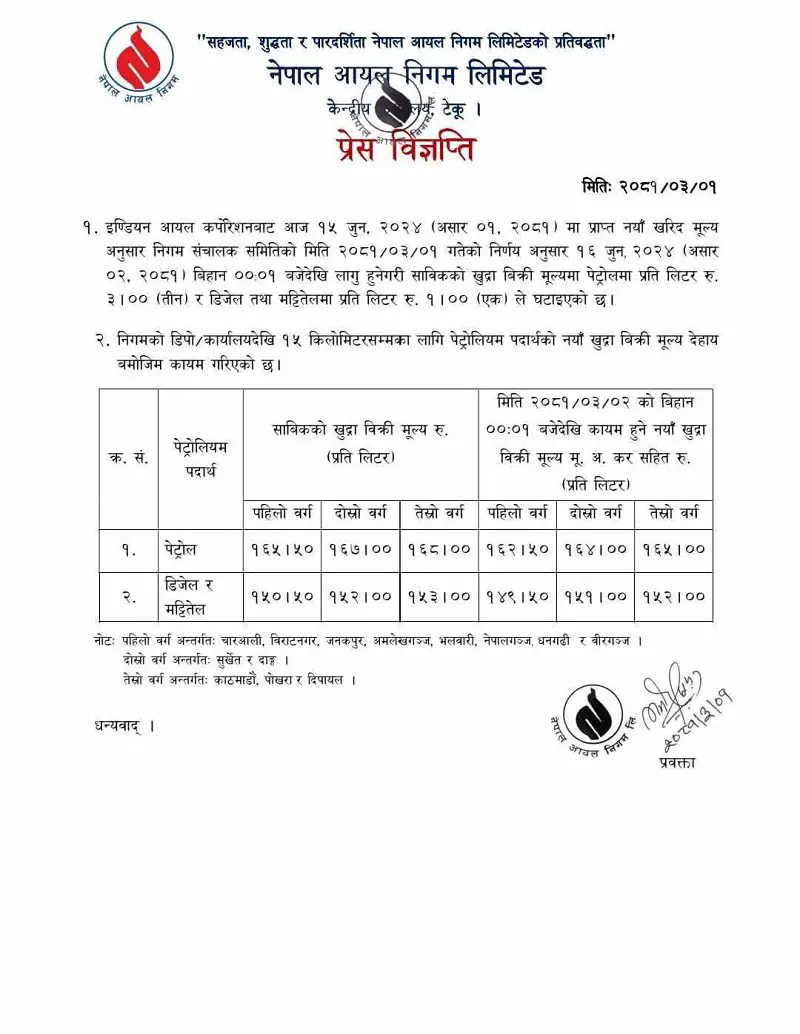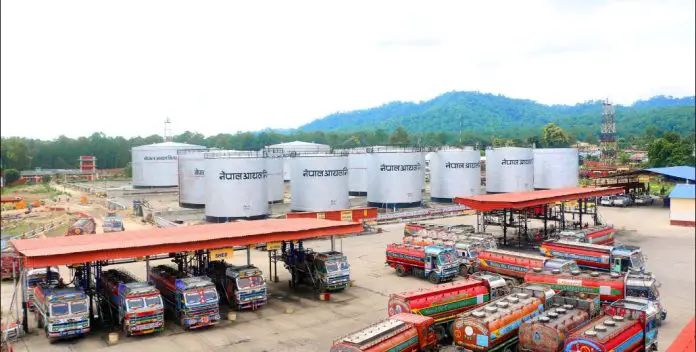Nepal Oil Corporation (NOC) has raised the price of petrol and diesel in Nepal effective from 00:01 AM on Tuesday, July 16, 2024 (Shrawan 01, 2081). The new cost adjustments also see prices lowered for diesel and kerosene all over Nepal.
NOC revised fuel costs after receiving new fuel cost structures from Indian Oil Corporation (IOC). The corporation has notified that petrol costs have now been increased by Rs 4 all over Nepal while diesel and kerosene costs have also gone up by Rs 3.
In Nepal, the fuel costs are implemented based on three different regions- First Category, Second Category, and Third Category. We have details below.
Don’t miss: Electric Vehicles tax in Nepal FY 2081/82
Jump to sections
NOC hikes fuel costs | Find new rates Shrawan 1 (July 16) update
According to the latest price, petrol now costs Rs 168.5 per liter in the Terai region including Birgunj, Nepalgunj, Janakpur, etc.
Similarly, the automatic pricing dictates Rs 170 per liter for petrol in Surkhet and Dang while in Kathmandu and Pokhara, petrol now costs Rs 171.
NOC has also increased the cost of diesel and kerosene for the entire country. According to the latest NOC notice, diesel now costs Rs 157.5 in the Terai region and Rs 159 in Inner Terai. In Kathmandu and Pokhara, diesel now costs Rs 160.

Latest LPG price in Nepal
In the meantime, cooking gas prices have been kept the same as before. Also called LPG or LP Gas, a single cylinder of LP gas costs Rs 1910. Unlike petrol and diesel/kerosene, LP Gas price is implemented uniformly across Nepal.

In its notice, NOC said that LP Gas price increased from IOC and it’s currently bearing a loss of Rs 300 per cylinder. But it maintains that the price has been kept as before considering the public’s interest.
Latest petrol price in Nepal | Summary
Below in the table, we have detailed the latest petrol, diesel, kerosene, and LPG (cooking gas) prices in Nepal.
| Cities | Petrol | Diesel and Kerosene | Cooking gas (LPG) |
| Birgunj, Nepalgunjg, Janakpur, etc. | Rs 1,910 | ||
| Surkhet and Dang | Rs 1,910 | ||
| Kathmandu, Pokhara, Dipayal | Rs 1,910 |
The new fuel cost comes inclusive of the green tax the government imposed from the FY 2081/82 budget.
Automatic Fuel Pricing in Nepal
The government decided to implement an automatic fuel pricing mechanism in Nepal from September 01, 2023. The decision was made to strengthen the public’s trust in NOC and make its operations transparent. This also helps with issues stemming from rising fuel costs. Now, the government will have less say in determining the fuel costs as they will be revised as per NOC’s own price structures.
As per the cost mechanism, NOC will maintain a margin of 2% profit on diesel and 2.5% profit on petrol while fixing the price. However, the corporation has said that it won’t keep a profit on LP Gas which is commonly used for cooking in Nepal.
nepal oil corporation began automatic pricing on fuel from september 01, midnight
Initially, the automatic gas petrol price in Nepal was first implemented on September 29, 2014 however as cross-subsidy was in place, it became ineffective.
Also read: Nepal-India Petroleum Pipeline Project Enters Second Stage
Letting the automatic pricing do the job
Fuel price gets a fair share of attention in Nepal especially when it gets higher. However, after the implementation of automatic pricing, NOC is letting the price be determined as per IOC’s own pricing structure while keeping its margin.
The corporation is also on a profiting trajectory in recent months which is giving it enough confidence to let fuel costs flow as per the automatic mechanism. This is another consecutive time NOC has decreased petrol and diesel costs in Nepal.
This should bring delight to the commuters who depend on their fuel-drive vehicles. Have your say on the latest fuel price in Nepal in our comment section below.



